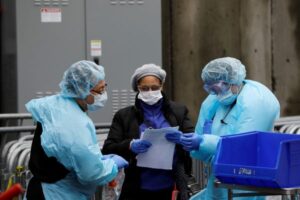
“Our oath is to do no harm … I spoke out for patient safety and as a result, I got terminated,” Ming Lin, a former Washington state emergency room physician, told Bloomberg.
Hospitals have begun to threaten to fire healthcare workers like Lin who publicize their working conditions during the coronavirus pandemic, which has seen a stark increase in patients since its outbreak late last year in China.
Lin told Bloomberg that he was fired following an interview he had given about a Facebook post that detailed the inadequacies in protective equipment and testing. He has since filed a lawsuit against his former employer.
In response, Charles Prosper, chief executive of the hospital network where Lin worked, told Bloomberg that Lin was “publicly critical” of the hospital’s readiness to treat patients and has since declined further comment to several news outlets.
Some hospitals, such as those in the NYU Langone Health system, have threatened “disciplinary action, including termination,” if their employees speak to any media outlets without authorization.
“Because information is constantly evolving, it is in the best interest of our staff and the institution that only those with the most updated information are permitted to address these issues with the media,” Jim Mandler, a spokesman for NYU Langone Health, said in a statement to Bloomberg. He told Business Insider that there has “always been a longstanding policy” regarding hospital workers speaking to the press “long before the coronavirus crisis.”
In contrast, Ruth Schubert, a spokeswoman for the Washington State Nurses Association, believes that “hospitals are muzzling nurses and other healthcare workers in an attempt to preserve their image.”
Healthcare workers “must have the ability to tell the public what is really going on inside the facilities where they are caring for [COVID]-19 patients,” she told Bloomberg.
The danger is clear from reports given by healthcare workers in facilities that have been overrun by patients who have tested positive for the coronavirus: a lack of personal protective equipment, or PPE, will not only help diminish the capacity for healthcare workers to effectively care for patients, but may also contribute to the spread of the disease.
Dr. Ayrenne Adams, a doctor in Boston, expressed her grievances in a Twitter post where she explained how she “had to clean [her] single-use face shield that [she had] worn the past three days with disinfectant used to clean hospital beds since [her hospital] ran out of sanitizing wipes.”
She then followed this statement with #GetMePPE, a hashtag that is being used on social media by healthcare workers that describe their struggles with dwindling resources in our nation’s hospitals.
“The public needs to hear these stories and other physicians need to hear them to be warned against what’s coming,” Nisha Mehta, a North Carolina radiologist explained. “It’s so important that everyone understands how bad this is going to get.”